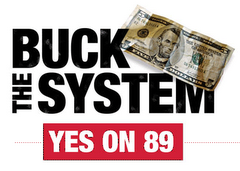Thomas Elias on Proposition 89
Thomas Elias has an important column in the Ventura County Star:
It's high time for Californians to admit that past attempts at campaign finance reform have not worked and that something new is needed.
Of course, the existing version of reform was never intended to work. It was planned as a smoke screen giving the appearance of reform while leaving special interests from labor unions and developers to casino Indian tribes and large corporations plenty of room to continue their corrupting activities.
Maybe that's why all those interests now oppose Proposition 89, an initiative on this fall's ballot that aims to provide public funding for candidates who display a significant level of grass-roots support.
That is a good point. The people who are opposing reform seem to be the people who are successful at dominating the current system. Voters have little power in Sacramento, it is big money special interests who are in charge.
But Californians can make decisions about what goes on here, and Proposition 89 will give them another chance in November. [...]
But candidates who collect large numbers of $5 donations (the number would change in accord with the number of votes cast as time goes on) would qualify for major public funding if they renounce large private donations. The money would come from a 0.2 percent increase in the income tax for banks and corporations, which would raise about $200 million a year.
It's not a perfect system because no one can stop candidates from spending on themselves or giving to the parties and other supposedly independent committees.
But it might be progress if only because it opens the door for nonmillionaires to seek high office without becoming beholden to big-money special interests that always expect something in return for their cash. That would be a big change from this year, when the three major primary election candidates were all so rich that when Democrat Phil Angelides put $1.5 million into his own campaign, the check was viewed as puny.
Money shouldn't be what determines who is elected. Democracy works when voters elect the best candidate, not the one with the most cash.









